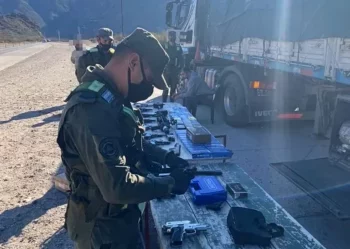Authorities in Chile are sounding the alarm over repeated seizures of small quantities of arms being trafficked through Argentina, especially as the Pacific nation seeks to rein in organized crime and maintain its low homicide rate.
The warning came from Chile’s Undersecretary of the Interior, Manuel Monsalve, who recently announced a collaborative effort between Argentine and Chilean authorities to investigate an arms trafficking route between the two countries. His announcement came on April 19, one day after a truck was stopped in Mendoza, Argentina, that was loaded with bullets, magazines, pistols and a kit to transform weapons into automatic rifles.
The weapons discovery in Mendoza, a known trafficking hub for people and drugs destined for Chile, followed a string of small arms seizures being moved to the Argentina-Chile border.
Earlier in April, a passenger on a bus was arrested while traveling from Argentina’s capital of Buenos Aires to Chile with 11 firearms hidden in two backpacks. Similarly, in November 2021, three Chileans transporting ammunition and camouflage clothing were arrested close to Argentina’s southern border with Lonquimay in Chile.
In April 2021, authorities discovered an arsenal of weapons and explosives in the home of a Chilean judicial official during a drug raid. It was later determined that the ammunition was from Argentina.
SEE ALSO: Chile Sees Drug Trafficking as Most Severe National Security Threat: Survey
Chile officials have attributed weapons trafficking to different sources. Some legislators have blamed the Mapuche resistance movement, consisting of indigenous communities looking to regain ancestral lands, for buying weapons from Argentina. Luis Toledo, director of the anti-drug unit at Chile’s Attorney General’s Office, has pointed the finger at foreign gangs that have established a presence in the country in recent years.
In a radio interview, Toledo said that while Chile is far from becoming a “narco-state,” it faces “the beginning of a path of no return” as the number of weapons circulating in the country grows.
Similarly, Monsalve warned after the latest seizure that the flow of arms into Chile could impact the country’s homicide rate, saying that “more than 50 percent of homicides are happening with firearms.”
“Therefore, the illegal trade and control of weapons are a priority task in the fight against crime.”
InSight Crime Analysis
Though Chile’s homicide rates are enviable when compared to much of Latin America, the evolution of its criminal dynamics is a concern.
Despite Chile’s tough restrictions on the manufacture, sale and circulation of firearms, a significant number of weapons are still moving illegally through the country. And not all of them are coming from Argentina.
In recent years, firearms have been smuggled into Chile from the United States, Europe and Asia through airports and maritime cargo. The port of Iquique has been a primary target for weapons smugglers, InSight Crime reported in August 2021.
Military intelligence has discovered that weapons arriving in Chile’s ports are often smuggled to Ecuador and even Colombia. Therefore, the flow of arms into Chile has a significance that extends well beyond Chile.
As Juan Pablo Toro, the executive director of AthenaLab, a leading Chilean security thinktank, told InSight Crime in 2020, “in a country with one of the lowest homicide rates in the region, it makes sense to be concerned as these events grow more frequent.”

